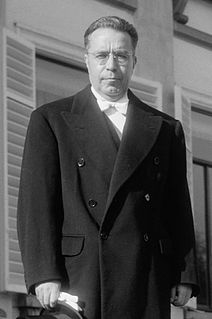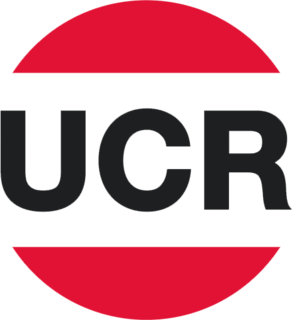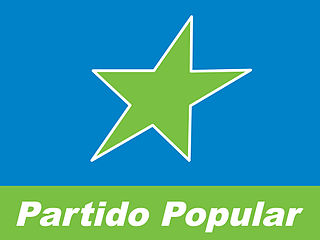The National Civic Union (Spanish: Unión Cívica Nacional, UCN) was a small centrist political party in Bolivia.

Spanish or Castilian is a Romance language that originated in the Castile region of Spain and today has hundreds of millions of native speakers in the Americas and Spain. It is a global language and the world's second-most spoken native language, after Mandarin Chinese.
A political party is an organized group of people, often with common views, who come together to contest elections and hold power in the government. The party agrees on some proposed policies and programmes, with a view to promoting the collective good or furthering their supporters' interests.

Bolivia, officially the Plurinational State of Bolivia is a landlocked country located in western-central South America. The capital is Sucre while the seat of government and financial center is located in La Paz. The largest city and principal industrial center is Santa Cruz de la Sierra, located on the Llanos Orientales a mostly flat region in the east of Bolivia.
The National Civic Union was founded in 1964. This party of recent origin was allegedly financed by the government of Víctor Paz Estenssoro to provide a token opposition, because other opposition parties boycotted the election on 31 May 1964. [1]

Ángel Víctor Paz Estenssoro was a Bolivian politician who served as President of Bolivia from 1952 to 1956, 1960 to 1964 and 1985 to 1989. He ran for president eight times and was victorious in 1951, 1960, 1964 and 1985. His 1951 victory was annulled by a military junta led by Hugo Ballivián, and his 1964 victory was interrupted by the 1964 Bolivian coup d'état.
The National Civic Union presented any candidates for the 10 Senate and 36 Chamber of Deputies seats up for election, but it garnered only a negligible vote. [2]
This page is based on this
Wikipedia article Text is available under the
CC BY-SA 4.0 license; additional terms may apply.
Images, videos and audio are available under their respective licenses.
Civic Platform is a liberal-conservative and conservative-liberal political party in Poland. Civic Platform came to power following the 2007 general election as the major coalition partner in Poland's government, with party leader Donald Tusk as Prime Minister of Poland. Tusk was re-elected as Prime Minister in the 2011 general election but stepped down three years later to assume the post of President of the European Council. Prime Minister Ewa Kopacz led the party in the 2015 general election but was defeated by the Law and Justice party. On 16 November 2015 Civic Platform government stepped down after exactly 8 years in power. In 2010 Civic Platform candidate Bronisław Komorowski was elected as President of Poland, but failed in running for re-election in 2015. PO is the second largest party in the Sejm, with 138 seats, and the Senate, with 33 seats. Civic Platform is a member of the European People's Party (EPP).

The National Action Party, founded in 1939, is a conservative political party in Mexico, one of the three main political parties in Mexico. Since the 1980s, it has been an important political party winning local, state, and national elections. In 2000, PAN candidate Vicente Fox was elected president for a six-year term; in 2006, PAN candidate Felipe Calderón succeeded Fox in the presidency. During the period 2000-2012, both houses of the Congress of the Union contained PAN pluralities, but the party had a majority in neither. In the 2006 legislative elections the party won 207 out of 500 seats in the Chamber of Deputies and 52 out of 128 Senators. In the 2012 legislative elections, the PAN won 38 seats in the Senate, and 114 seats in the Chamber of Deputies. The members of this party are colloquially called Panistas.

The Radical Civic Union is a centrist social-liberal political party in Argentina. The party has been ideologically heterogeneous, ranging from Social liberalism to social democracy. The UCR is a member of the Socialist International.
The National Labour Organisation, also known as the National Labour Committee or simply as National Labour, was a British political group formed after the 1931 creation of the National Government to co-ordinate the efforts of the supporters of the government who had come from the Labour Party. The most prominent Labour Party member involved in the government was the Prime Minister, Ramsay MacDonald. National Labour sponsored Parliamentary candidates, but did not consider itself a full political party as it had no policy distinctive from that of the government which it supported. After MacDonald's death, the group continued in existence until winding up on the eve of the 1945 general election and its newsletter ceased publication two years later.

The Nationalist Republican Liberal Movement is a center-to-right, pro-business liberal political party in Panama.

The People's Party is a Panamanian Christian democratic political party. It was one of Latin America's most conservative and anti-communist Christian democratic parties.
The ideological foundation of the party is based on the social doctrine of the Catholic Church.

The Civic Renewal Party was a Panamanian right liberal political party.
The Socialist Party-1 is a socialist political party in Bolivia.
Panama held a general election on 7 May 1989, with the goal of electing both a new President of the Republic and a new Legislative Assembly. The two primary candidates in the presidential race were Guillermo Endara, who headed Democratic Alliance of Civic Opposition (ADOC), a coalition opposed to military ruler Manuel Noriega, and Carlos Duque, who headed the pro-Noriega Democratic Revolutionary Party (PRD).
The Panama held a general election on 10 May 1964, electing both a new President of the Republic and a new National Assembly.
The Panama held a general election on 20 May 1960, electing both a new President of the Republic and a new National Assembly.
The Democratic Action Party was a Panamanian conservative political party.
The Nationalist Party was a Panamanian small radical nationalist
, personalistic political party.
The Progressive National Party was a Panamanian conservative nationalist, personalistic political party.
The National Patriotic Coalition was a Panamanian conservative nationalist political party.
The National Liberation Movement was a Panamanian right-wing liberal political party.
The National Civic Party was a Panamanian small liberal political party.
The Renewal Party was a Panamanian right liberal political party.
The Authentic Revolutionary Party was a political party in Bolivia.
The Anti-Communist Bolivian Front was a small right-wing political party in Bolivia.







